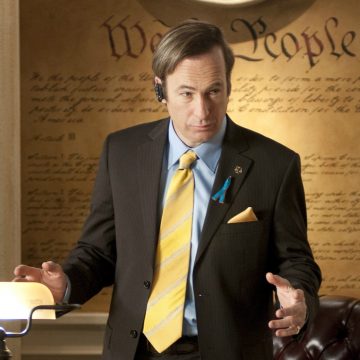“When the going gets tough, you don’t want a criminal lawyer — you want a criminal lawyer.”
This line comes from a scene halfway through the second season of the hit show Breaking Bad. Jesse Pinkman and his meth-cooking partner Walter White, a high-school chemistry teacher who turns to the drug trade to pay for his cancer treatment, are in trouble: a drug dealer that sells their product has been arrested and their operation is at risk. Jesse explains to Walt why local attorney Saul Goodman is the right person to solve their problems.
Saul, who viewers soon meet in his suburban strip-mall office, takes every legal stereotype to the extreme: he advertises his practice with over-the-top TV commercials, has a blow-up version of the Statue of Liberty on top of his building and he wallpapers his office with the U.S. constitution. The punch-line-prone attorney turns out, however, to be a valuable resource for the amateur meth cooks and he remains a fixture on Breaking Bad up to its last episode, which aired earlier this fall.
Now, a spin-off series is in the works that will focus on Saul’s legal career before the events of Breaking Bad. The show, which will be produced by the American cable network AMC, is called Better Call Saul, after the sleazy lawyer’s commercial catch phrase.
AMC likely picked the right character to develop further. Saul, who is played by 51-year-old comedian Bob Odenkirk, delighted viewers of Breaking Bad — which included real-life criminal lawyers.
“He’s a fantastically entertaining character,” says Jason Tarnow, a Vancouver-based criminal lawyer and fan of the show, in an interview with Precedent. “But I don’t think you can take him too seriously. He’s a comedic exaggeration of the stereotypes people have of lawyers.”
In addition to providing some much-needed comic relief in a predominantly dark show, Saul also gets results for his clients. As a criminal lawyer, in both meanings of the word, Saul connects Jesse and Walt to major players in the drug business, launders elicit meth profits and interferes with police investigations.
Indeed, Saul is like many criminal lawyers on television: he seems to have an unlimited supply of creativity and legal expertise.
These kinds of characters are entertaining to watch, but they rarely exist in the real world, says J. Thomas Sullivan, an American criminal lawyer who teaches a course on criminal law in film at the William H. Bowen School of Law, in an interview with Precedent. “I think the way criminal lawyers are often depicted suggests that they have more power in the legal system than they really do. They can’t always pull some rabbit out of a hat to make every problem go away.”
Realistic or not, Better Call Saul could hit the airwaves as early as summer 2014. Until then, check out the “official” website of Saul Goodman.
Photo credit: AMC


